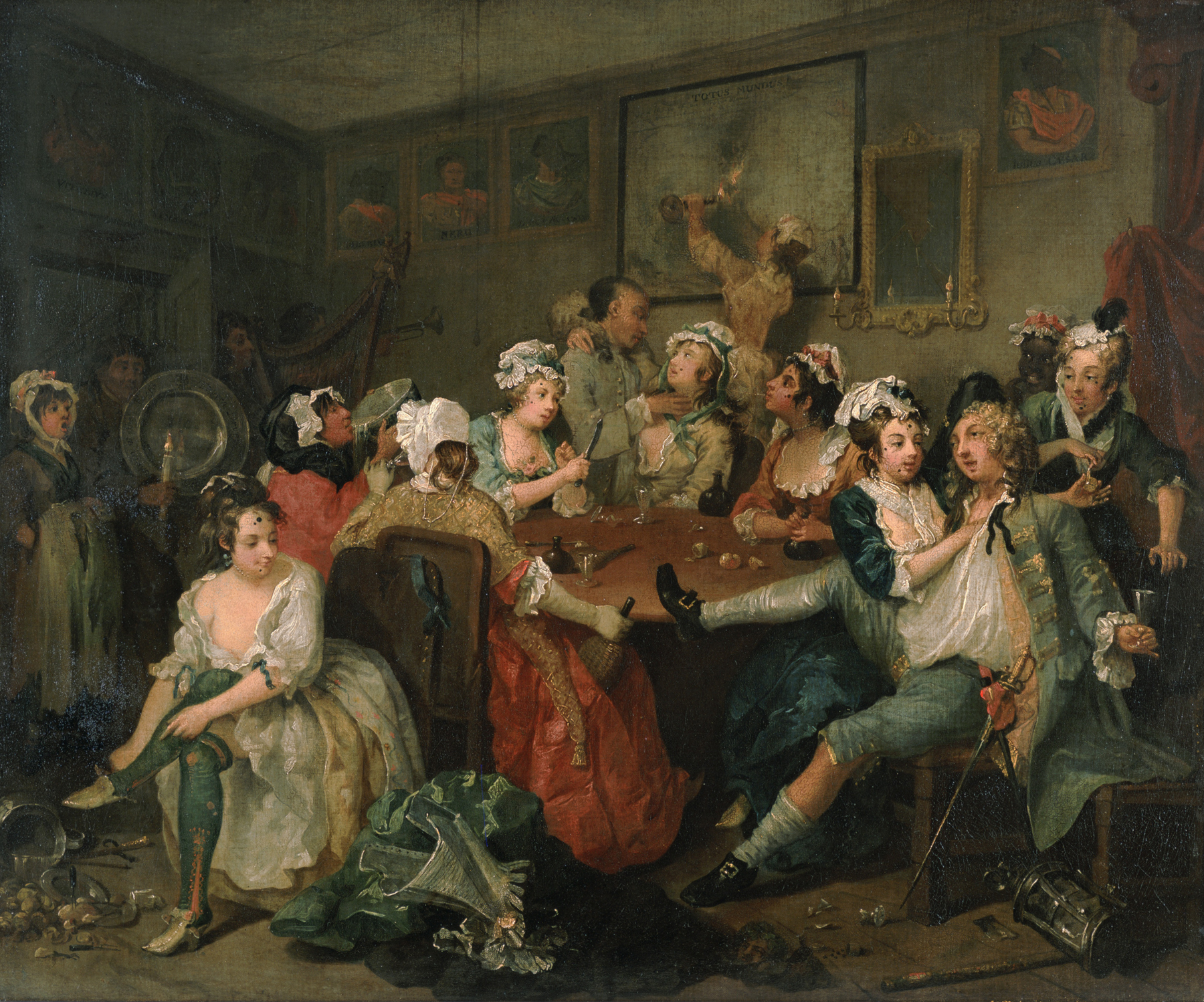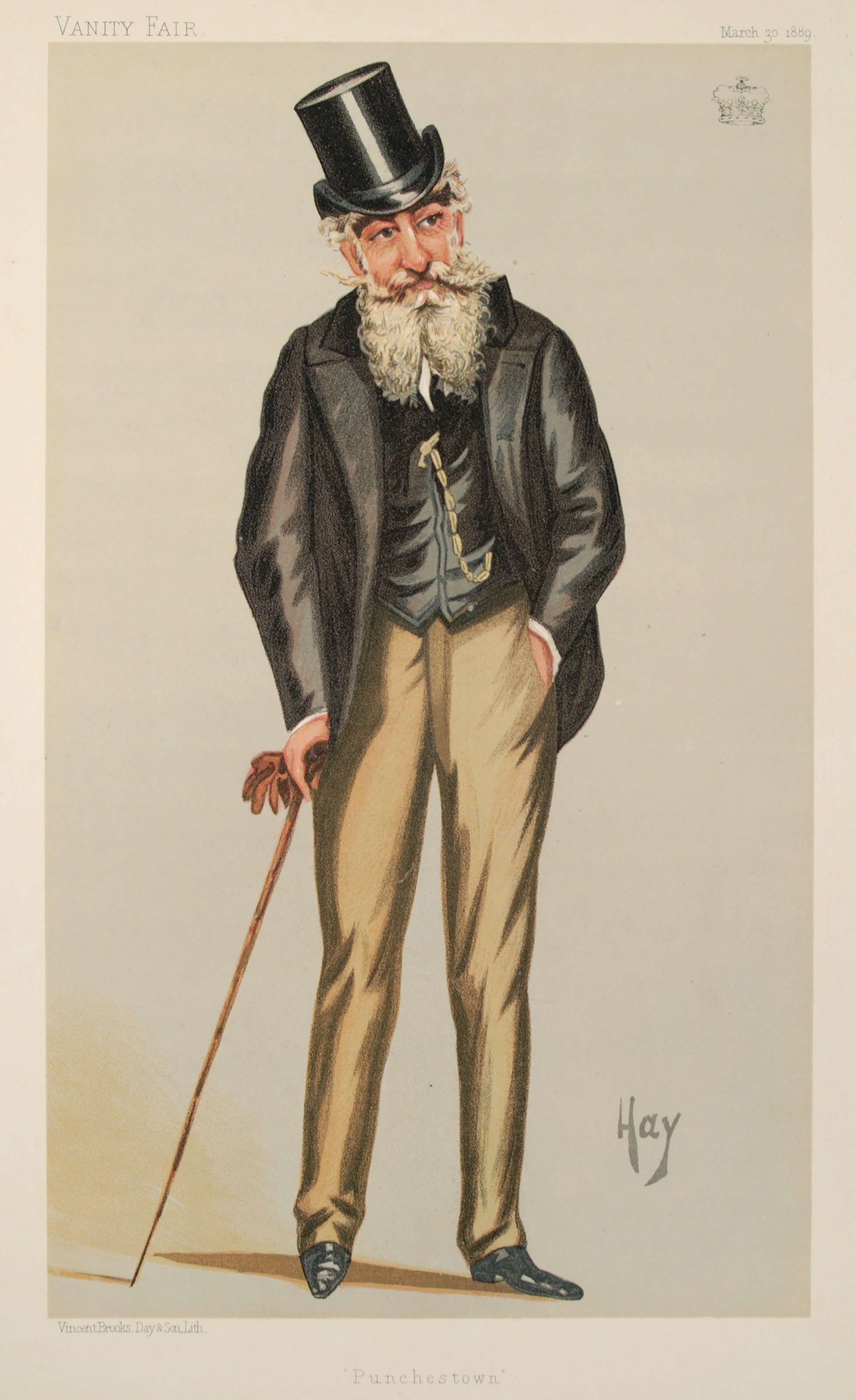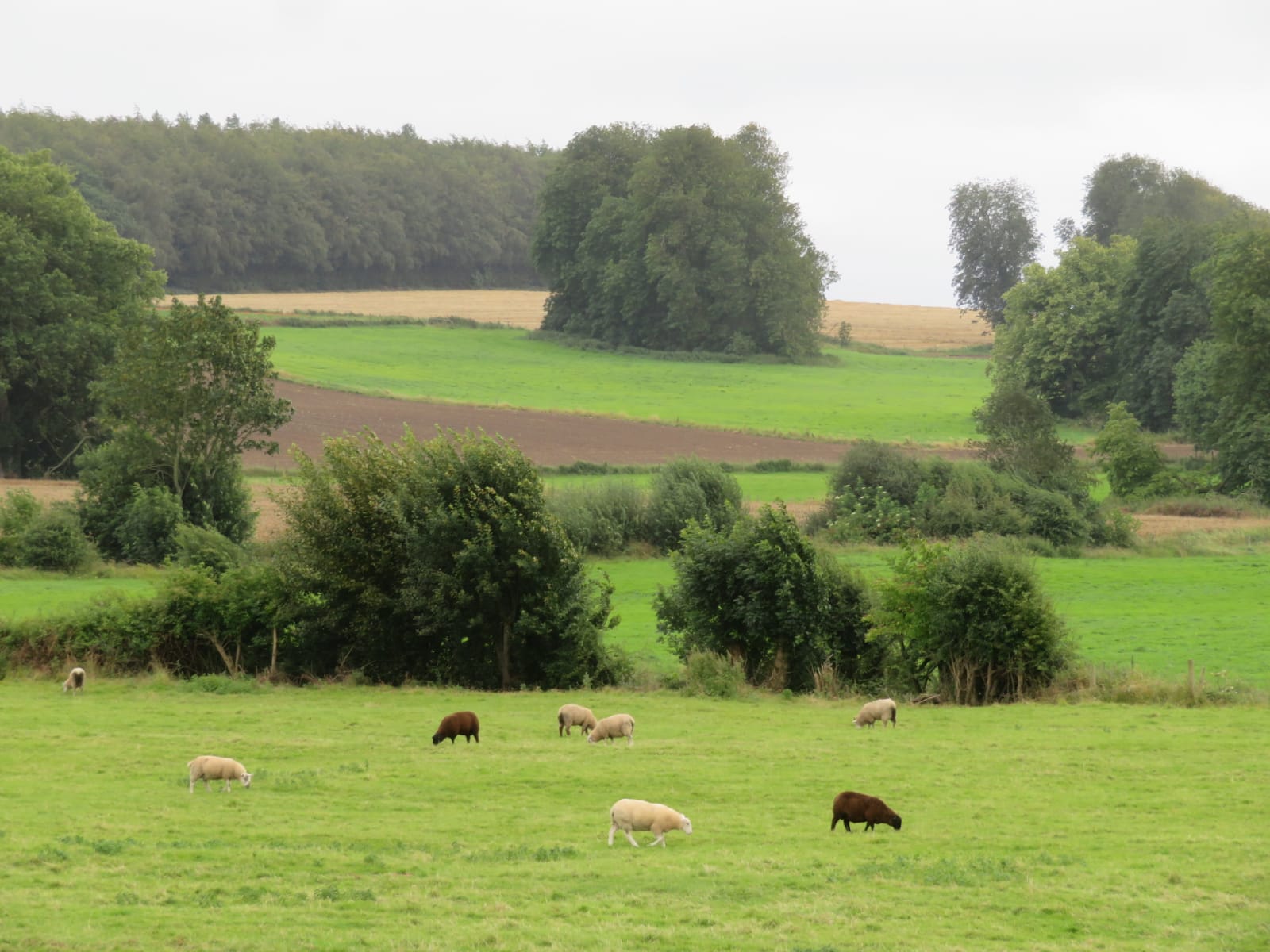|
Henry Moore, 4th Earl Of Drogheda
Henry Moore, 4th Earl of Drogheda (7 October 1700 – 29 May 1727), styled Viscount Moore from 21 May to 7 June 1714, was an Irish peer and rake who briefly served in the Parliament of Great Britain. He inherited his title and estates at the age of 13, when his father and grandfather died in quick succession. Drogheda rapidly became a debauchee, and after squandering large sums, died at the age of 26, leaving his younger brother a heavily encumbered estate. Moore was the eldest son of Charles Moore, 2nd Viscount Moore of Drogheda by his wife Lady Jane Loftus, the daughter of Arthur Loftus, 3rd Viscount Loftus. His father Charles was the heir apparent of Henry Hamilton-Moore, 3rd Earl of Drogheda. Viscount Moore died on 21 May 1714, followed shortly after by his father the 3rd Earl on 7 June, upon which Henry succeeded in the earldom and family estates and quickly became a drunkard. Sent on the Grand Tour by his guardian, the Dowager Countess of Drogheda, he escaped from his gover ... [...More Info...] [...Related Items...] OR: [Wikipedia] [Google] [Baidu] |
Rake (stock Character)
In a historical context, a rake (short for rakehell, analogous to "hellraiser") was a man who was habituated to immoral conduct, particularly womanizing. Often, a rake was also prodigal, wasting his (usually inherited) fortune on gambling, wine, women, and song, and incurring lavish debts in the process. Cad is a closely related term. Comparable terms are "libertine" and "debauchee". The Restoration rake was a carefree, witty, sexually irresistible aristocrat whose heyday was during the English Restoration period (1660–1688) at the court of King Charles II. They were typified by the "Merry Gang" of courtiers, who included as prominent members the John Wilmot; George Villiers; and Charles Sackville, who combined riotous living with intellectual pursuits and patronage of the arts. At this time the rake featured as a stock character in Restoration comedy. After the reign of Charles II, and especially after the Glorious Revolution of 1688, the cultural perception of the ra ... [...More Info...] [...Related Items...] OR: [Wikipedia] [Google] [Baidu] |
Edward Moore, 5th Earl Of Drogheda
Edward Moore, 5th Earl of Drogheda Privy Council of Ireland, PC (I) (1701 – 28 October 1758) was an Anglo-Irish peer and politician. Background Moore was the second son of Charles Moore, Lord Moore, son of Henry Hamilton-Moore, 3rd Earl of Drogheda, and Jane Loftus, daughter of Lord Loftus.John Debrett, ''Debrett's Peerage of England, Scotland, and Ireland'' (1840), p. 249. He served in the Irish House of Commons as the Member of Parliament for Dunleer (Parliament of Ireland constituency), Dunleer between 1725 and 1727 when he succeeded to his elder brother's titles and took his seat in the Irish House of Lords. In 1748 he was invested as a member of the Privy Council of Ireland and made a Lord Lieutenant of County Meath, Governor of Meath. He married, firstly, Lady Sarah Ponsonby, daughter of Brabazon Ponsonby, 1st Earl of Bessborough, and Sarah Margetson, in 1727, with whom he had six sons and two daughters. Following her death on 19 January 1736, Moore married, secondly, Bri ... [...More Info...] [...Related Items...] OR: [Wikipedia] [Google] [Baidu] |
British MPs 1722–1727
British may refer to: Peoples, culture, and language * British people, nationals or natives of the United Kingdom, British Overseas Territories, and Crown Dependencies. ** Britishness, the British identity and common culture * British English, the English language as spoken and written in the United Kingdom or, more broadly, throughout the British Isles * Celtic Britons, an ancient ethno-linguistic group * Brittonic languages, a branch of the Insular Celtic language family (formerly called British) ** Common Brittonic, an ancient language Other uses *''Brit(ish)'', a 2018 memoir by Afua Hirsch *People or things associated with: ** Great Britain, an island ** United Kingdom, a sovereign state ** Kingdom of Great Britain (1707–1800) ** United Kingdom of Great Britain and Ireland (1801–1922) See also * Terminology of the British Isles * Alternative names for the British * English (other) * Britannic (other) * British Isles * Brit (other) * Briton (d ... [...More Info...] [...Related Items...] OR: [Wikipedia] [Google] [Baidu] |
1727 Deaths
Seventeen or 17 may refer to: *17 (number), the natural number following 16 and preceding 18 * one of the years 17 BC, AD 17, 1917, 2017 Literature Magazines * ''Seventeen'' (American magazine), an American magazine * ''Seventeen'' (Japanese magazine), a Japanese magazine Novels * ''Seventeen'' (Tarkington novel), a 1916 novel by Booth Tarkington *''Seventeen'' (''Sebuntiin''), a 1961 novel by Kenzaburō Ōe * ''Seventeen'' (Serafin novel), a 2004 novel by Shan Serafin Stage and screen Film * ''Seventeen'' (1916 film), an American silent comedy film *''Number Seventeen'', a 1932 film directed by Alfred Hitchcock * ''Seventeen'' (1940 film), an American comedy film *''Eric Soya's '17''' (Danish: ''Sytten''), a 1965 Danish comedy film * ''Seventeen'' (1985 film), a documentary film * ''17 Again'' (film), a 2009 film whose working title was ''17'' * ''Seventeen'' (2019 film), a Spanish drama film Television * ''Seventeen'' (TV drama), a 1994 UK dramatic short starring Christien ... [...More Info...] [...Related Items...] OR: [Wikipedia] [Google] [Baidu] |
1700 Births
Seventeen or 17 may refer to: * 17 (number), the natural number following 16 and preceding 18 * one of the years 17 BC, AD 17, 1917, 2017 Literature Magazines * ''Seventeen'' (American magazine), an American magazine * ''Seventeen'' (Japanese magazine), a Japanese magazine Novels * ''Seventeen'' (Tarkington novel), a 1916 novel by Booth Tarkington *''Seventeen'' (''Sebuntiin''), a 1961 novel by Kenzaburō Ōe * ''Seventeen'' (Serafin novel), a 2004 novel by Shan Serafin Stage and screen Film * ''Seventeen'' (1916 film), an American silent comedy film *''Number Seventeen'', a 1932 film directed by Alfred Hitchcock * ''Seventeen'' (1940 film), an American comedy film *''Eric Soya's '17''' (Danish: ''Sytten''), a 1965 Danish comedy film * ''Seventeen'' (1985 film), a documentary film * ''17 Again'' (film), a 2009 film whose working title was ''17'' * ''Seventeen'' (2019 film), a Spanish drama film Television * ''Seventeen'' (TV drama), a 1994 UK dramatic short starring Chris ... [...More Info...] [...Related Items...] OR: [Wikipedia] [Google] [Baidu] |
Earl Of Drogheda
Earl of Drogheda is a title in the Peerage of Ireland. It was created in 1661 for The 3rd Viscount Moore. History The Moore family descends from Sir Garrett Moore, a staunch friend of Hugh O'Neill, the Great Earl of Tyrone, whose submission he facilitated, hosting the negotiations that led to the Treaty of Mellifont in 1603 and ending The Nine Years' War. He represented Dungannon in the Irish House of Commons, and served as President of Munster. In 1616 he was raised to the Peerage of Ireland as Baron Moore, of Mellefont in the County of Louth. He was further honoured in 1621 when he was made Viscount Moore, of Drogheda, also in the Peerage of Ireland. He was succeeded in 1628 by his son Charles, the second Viscount, who was killed at the Battle of Portlester while fighting for Charles I in the English Civil War. Charles was succeeded by his son Henry, the aforementioned third Viscount, who was raised to an earldom, as Earl of Drogheda, in 1661. The first Earl's younger so ... [...More Info...] [...Related Items...] OR: [Wikipedia] [Google] [Baidu] |
John Pitt (soldier)
John Pitt (1698–1754) was a British Army officer, colonial administrator and politician who sat in the House of Commons between 1720 and 1734. Pitt was the youngest son of Governor Thomas "Diamond" Pitt who made a fortune while in India and returned to Britain to found a political dynasty. He attended Eton College, and went into the army where he rose to the rank of lieutenant colonel and served as an aide-de-camp to George I. Pitt served as Member of Parliament for Hindon from 1720 to 1722, Old Sarum from 1724 to 1726 and Camelford from 1727 to 1734. From 1728 to 1737 he served as Governor of Bermuda. Pitt was cut out of his father's will after a dispute.Douglas p.24 He was the brother-in-law of James Stanhope, 1st Earl Stanhope, the effective Prime Minister between 1717 and 1721, and the uncle of William Pitt. He was married to Mary Belasyse, the daughter of the Viscount Fauconberg. References Bibliography * Black, Jeremy. ''Pitt the Elder''. Cambridge University Pres ... [...More Info...] [...Related Items...] OR: [Wikipedia] [Google] [Baidu] |
Sir Thomas Hales, 3rd Baronet
Sir Thomas Hales, 3rd Baronet ( – October 1762), of Beakesbourne in Kent, was an English courtier and Whig politician who sat in the House of Commons for 37 years between 1722 and 1762. Hales was the eldest son of Sir Thomas Hales, 2nd Baronet, of Brymore, and his wife Mary Pym, daughter of Sir Charles Pym, 1st Baronet of Brymore. He matriculated at Oriel College, Oxford in 1711 and was admitted at the Inner Temple. He succeeded his father as 3rd Baronet on 7 January 1748. Hales entered Parliament at the 1722 British general election as Whig Member of Parliament for Minehead, being a member of the Duke of Dorset's faction and supporting the Walpole and Pelham governments. He subsequently also represented Camelford, Grampound, Hythe and East Grinstead, being an MP for most of the last forty years of his life. The only break in his Parliamentary career came in 1741: at the notoriously corrupt rotten borough of Grampound, his opponents had contrived a disagreement over who ... [...More Info...] [...Related Items...] OR: [Wikipedia] [Google] [Baidu] |
William Sloper (c (1883–1955), American stockbroker and survivor of the sinking of the RMS ''Titanic''
{{human name disambiguation, Sloper, William ...
William Sloper may refer to: *William Sloper (died 1743) (c.1658–1743), deputy paymaster general and MP for several boroughs *William Sloper (1709–1789), son of the above, MP for Great Bedwyn *William Charles Sloper (aft. 1728 – aft. 1813), son of the above, MP for St Albans *William Thomson Sloper William Thomson Sloper (December 13, 1883 − May 1, 1955) was an American stockbroker and survivor of the sinking of the RMS ''Titanic''. Sloper, who was 28 when the ''Titanic'' sank, traveled as a first-class passenger and was saved after bo ... [...More Info...] [...Related Items...] OR: [Wikipedia] [Google] [Baidu] |
Member Of Parliament
A member of parliament (MP) is the representative in parliament of the people who live in their electoral district. In many countries with bicameral parliaments, this term refers only to members of the lower house since upper house members often have a different title. The terms congressman/congresswoman or deputy are equivalent terms used in other jurisdictions. The term parliamentarian is also sometimes used for members of parliament, but this may also be used to refer to unelected government officials with specific roles in a parliament and other expert advisers on parliamentary procedure such as the Senate Parliamentarian in the United States. The term is also used to the characteristic of performing the duties of a member of a legislature, for example: "The two party leaders often disagreed on issues, but both were excellent parliamentarians and cooperated to get many good things done." Members of parliament typically form parliamentary groups, sometimes called caucuse ... [...More Info...] [...Related Items...] OR: [Wikipedia] [Google] [Baidu] |
Richard Coffin (1684-1766)
Richard Coffin may refer to: * Richard Coffin (1456–1523), Sheriff of Devon * Richard Coffin (1623–1700), Sheriff of Devon * Richard Coffin (1684–1766), British politician, MP for Barnstaple See also * Richard Pine-Coffin (1908–1974), British army officer {{hndis, Coffin, Richard ... [...More Info...] [...Related Items...] OR: [Wikipedia] [Google] [Baidu] |
Moore Abbey
Moore Abbey () is a monastic house on the east bank of the River Barrow at Monasterevin in County Kildare, Ireland. History Moore Abbey was designed by the English engineer Christopher Myers in the Gothic style and was built in the late 1760s for the 6th Earl of Drogheda (who later became Field Marshal the 1st Marquess of Drogheda). The 10th Earl of Drogheda abandoned the house after the First World War and it was leased to John Count McCormack, the tenor, from 1925 to 1937. The 10th Earl then put the abbey up for sale shortly after Count McCormack moved out and in 1938 it became the Irish headquarters of the Sisters of Charity of Jesus and Mary The Congregation of the Sisters of Charity of Jesus and Mary is a Roman Catholic religious institute founded in Ghent, Belgium. An enclosed religious order, its main apostolate is helping the needy and the sick, inspired by the work of Saint Vincen ..., now known as the Muiríosa Foundation. References {{coord, 53.136068, N, 7. ... [...More Info...] [...Related Items...] OR: [Wikipedia] [Google] [Baidu] |


